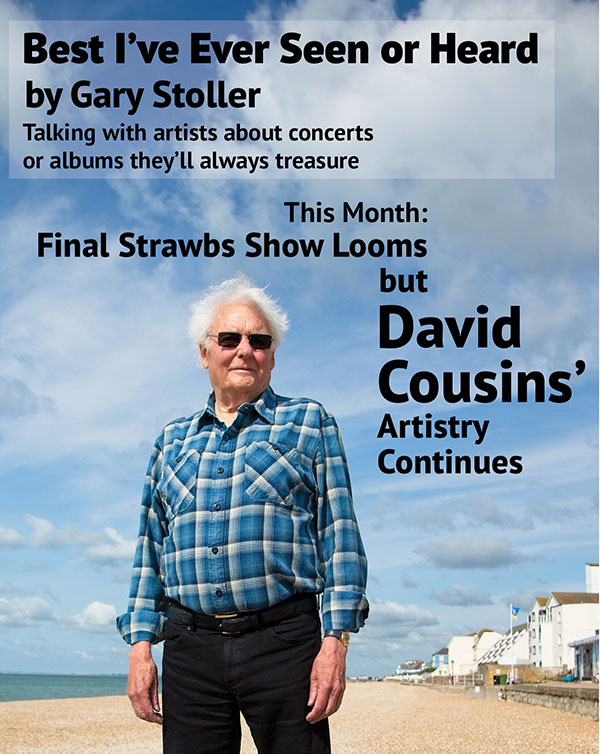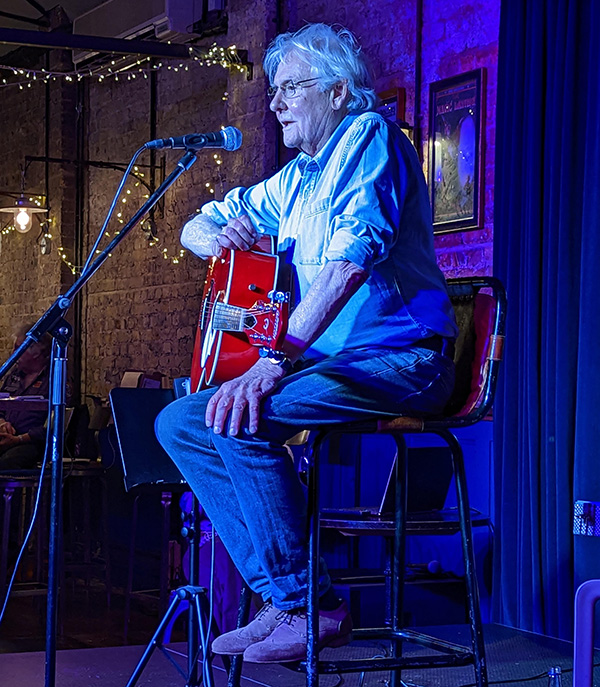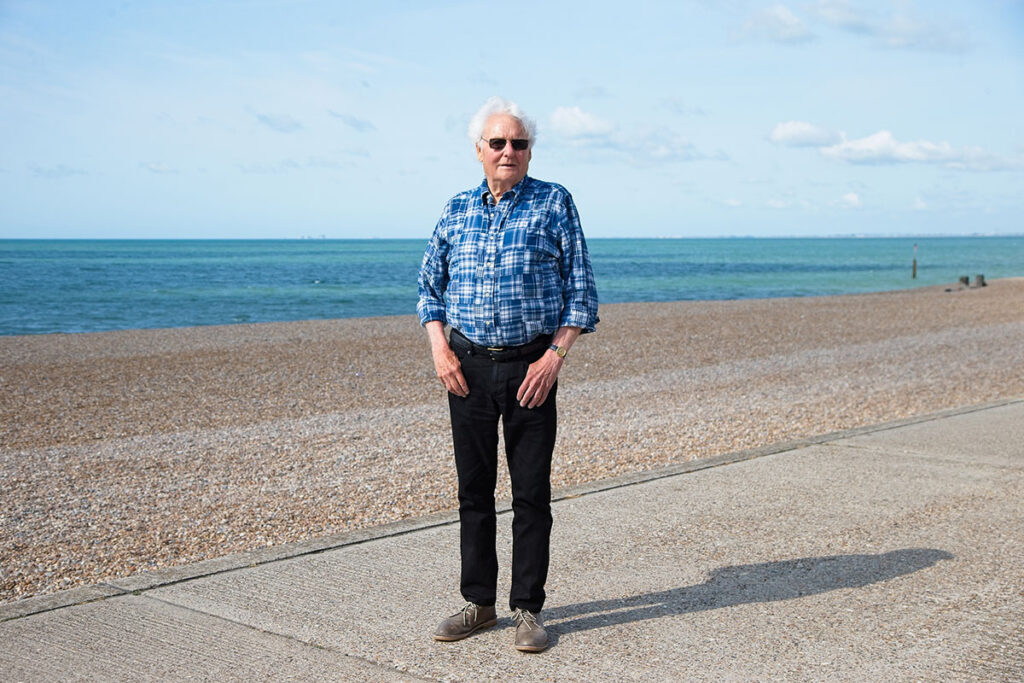
England’s Cropredy Festival has been home to many historic performances since it was launched in 1980 by the legendary British folk-rock group Fairport Convention. Another historic performance looms at the festival, now called Fairport’s Cropredy Convention. On August 11, the trailblazing, progressive English folk-rock band Strawbs will take the stage for its final performance after playing live since the 1960s.
David Cousins, Strawbs’ founder, singer-songwriter and guitarist, has a severely compromised immune system and was diagnosed with MDS (myelodysplastic syndromes), a type of cancer that damages cells in bone marrow. Cousins, though, is not about to throw in the towel. He recruited South African musicians for a new Strawbs album, The Magic of It All, and he tells me he plans to keep making records.
The Magic of It All on England’s Cherry Red Records label also features two 1970s Strawbs members, keyboardist Blue Weaver and bassist John Ford. It “has a totally fresh and invigorating feel,” Cousins says. “It certainly will not be the last Strawbs album.”
The new album resulted from a trip Cousins made to South Africa to visit his partner’s family. Strawbs had never played in the country, and he decided to play four solo shows.
“To my surprise, I drew 400 people to an open-air show in Stellenbosch,” he says. “It became apparent that Strawbs were very popular in the 1970s because of the power of the songs, particularly ‘New World,’ ‘Lay Down’ and ‘Part of the Union.’”
A documentary producer approached Cousins about making a film to explain Strawbs’ influence worldwide, and a decision was made to record in Cape Town with local musicians and singers.
“Every minute of the recordings was filmed for inclusion in the footage of the documentary called The Magic of It All,” he says. “It will be finished later this year when the footage from the Cropredy festival becomes available.”
Cousins also co-wrote “The Water Song” with Kendra, a 15-year-old South African schoolgirl, to support an initiative emphasizing the importance of conserving water worldwide and encouraging children in other countries to sing the song in their own languages. The song, which was played at a UN 2023 Water Conference this year, is sung by a South African children’s choir comprised of 8- and 9-year-olds and played on marimbas by a grade 10 marimba band.

I ask Cousins whether he agrees with AllMusic’s description of Strawbs: “sprawling, eclectic folk-rock act whose spacy mix of rock and neo-classical presaged prog-rock.”
Cousins says the adjectives “sprawling” and “spacy” shouldn’t be included.
“Strawbs has been a continuous evolution,” he says. “The continuity of the band is the songs, which are in the troubadour tradition of the traveling singer commentating on society and his personal involvements.”
With scores of albums in Strawbs’ catalog, I ask Cousins which ones he views as his greatest accomplishments. He names two albums from the 1970s.
“Grave New World for content,” he replies. “It was muscular, inventive and thoughtful. “Deep Cuts was the best-sounding album.”
What about live shows? Which ones stand out as the best or most memorable in Strawbs’ long career?
“Strawbs in Tokyo for a TV special was so memorable for the set and the production, although the audience was restrained.” Cousins responds. “Strawbs at Maple Leaf Gardens (in Toronto) was the band at its very peak.”
Cousins says his best show as a solo artist was a guest appearance in a tent at England’s Cambridge Folk Festival in 1981 after Strawbs had temporarily folded and he was working in the radio business.
“There was no pressure anymore,” he recalls, “just the songs to speak for themselves. ‘A Song for Me’ took on a special meaning that afternoon. Don McLean was watching. His manager turned to him and said: ‘He’s as good as Dylan.’ Don disagreed!”
Like so many artists, Cousins cites Dylan as a major influence. When I interviewed Cousins in 2016, he said the best concert he attended during his lifetime was Dylan’s 1965 BBC TV performance. The most influential show was a mid-1960s concert by Bill Monroe and the Bluegrass Boys in the garden of a home owned by bluegrass musician Bill Clifton in Kent, England.

“I did not meet Bob Dylan, but he was one of the reasons why I started to write songs,” says Cousins, who sat in the front row about 10 feet away from Dylan at the BBC show. “Strawbs were the first British bluegrass band, and seeing Bill Monroe close-up made us realize that we were a pale imitation. Bill Keith’s banjo playing was a revelation. Songwriting took precedence after that.”
The 1965 Dylan show may have been No. 1 in Cousins’ mind seven years ago, but, when I now pose the question to him, another concert captures the top spot.
“The best show I have ever seen live is Prince,” he says. “He had everything. I’ve seen Bruce Springsteen, Michael Jackson, the Stones and U2 close-up, but Prince had more. I’ve played on the same bill as Fleetwood Mac, Pink Floyd, the Eagles and Santana, but nothing compares to Prince.”
I mention to Cousins that I regret waiting to 2016 to see my first live Strawbs show. I was blown away by the show in a small club, the Iron Horse in Northampton, Massachusetts, and came away thinking that Strawbs was the best prog-rock band in the industry.
When Cousins left the stage after that exhilarating performance, he appeared upset and invited me to sit at the bar for our interview. He told me he learned at the show that his wife was divorcing him.
“I picked up an email,” he now explains, “that my then wife had sent to her daughter saying she was going to divorce me and tell me when I got home. I took serious offense, turned the tables and divorced her. Settlement: Does that ring a bell? There comes a time when every settlement is due.”
I now find it amazing that, embroiled in personal problems, Cousins mustered such a powerful performance seven years ago at age 71 in Northampton.
As we sat at the bar that night, I asked him how Strawbs should be regarded historically.
The key, Cousins said, has been how fans have identified with and become emotionally attached to Strawbs songs. “People are getting married to our songs, and people are burying the dead to our songs.”
It may, though, be too soon to gift-wrap Strawbs place in music history. The Magic of It All album was released just a few weeks ago and has 11 new songs. The record was engineered by Peter Pearlson, who worked with Paul Simon and South African musicians on Simon’s blockbuster Graceland album.
“These songs are deeply personal and among the best I have ever written,” Cousins says. “They are observations on the state of politics as I see it, they are travelogues, they tell stories. Every word of every line has a meaning to me. It’s up to you to decipher them.”

